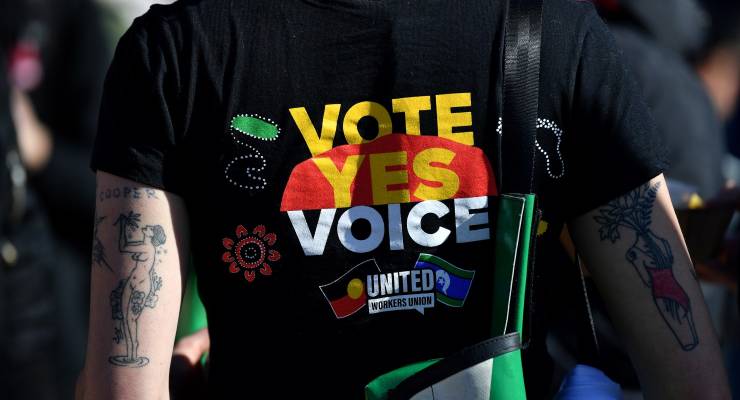
More than 5 million Australians supported an Indigenous Voice to Parliament in the referendum vote — a vision that evolved from years of patient community conversation and consensus-building. As many of us navigate the grief after the result, there are seeds of hope emerging.
For those of us who have spent our working lives in the social, health and service sectors, the Voice represented much more than a symbolic gesture. A constitutionally enshrined Voice to Parliament was an opportunity to reboot decades of decision-making structures.
Most Australians could agree the “rinse and repeat” of paternalistic policymaking has ultimately failed to meaningfully empower Aboriginal and Torres Strait Islander communities, nor substantially improve lives. It was, and still is, time for a fundamental shift.
I backed the Yes campaign because I have seen a voice in action. I believe it remains relevant even now.
Thirteen years ago, I found myself in the Kimberley in the north-western town of Broome. As I touched down from the east coast, red dust invaded all parts of my being. I was to be (now Senator) Patrick Dodson’s legal intern and I was nervous as all get out.
I was arriving amid something unprecedented in the Kimberley. Dodson, the Yawuru elders and community were developing an ambitious cultural and economic management plan after a landmark native title settlement for the Yawuru people. Community development housing, training and employment, education and language preservation schemes were growing across the region. Local voices were central to and driving the model.
At the time of my visit, Dodson was not yet a senator. But he was indisputably a giant. Known across Australia as “the father of reconciliation”, I knew I was headed into the unknown, somewhere where I felt small, out of place and distinctly non-Aboriginal. It didn’t take long for the generosity of that special town to reveal itself to me; within days I was invited to join the local sporting league, assist in youth workshops, join picnics, traditional camping trips and even hauled out to the infamous Derby race day. I learnt to catch mud crabs and how to cook them the “Yawuru” way, forking crab claw meat through sticky mounds of rice soaked in sweet soy, garlic and chilli. Trust me, you’ll never eat crab the same again.
I sat with Dodson in his office one afternoon that year, my notepad and voice recorder poised, as he embarked on an oral history of the multi-decade struggle for Aboriginal justice, truth and land rights. Over three patient hours, he stitched together for me with extraordinary eloquence the plight and journey of his people. It has taken me years to understand what he knew then with intense clarity. That despite our ugly past, we could be a better Australia together, and we had to try.
This year, thousands of us turned out to try.
The movement for Yes in 2023 has been a living example of the “public square” at its most palpable. Kids, retirees, families, singles, migrants, health workers, unionists, lawyers, environmentalists, athletes and artists all showed up in droves. We walked bridges, flooded community halls, coordinated beach picnics, phone-boothing parties, marathons, cross-cultural fireside yarns, local barbecues, kitchen table conversations and weekend market stalls.
High on hope, we marvelled at the beauty of this seemingly “new” Australia, and when votes were finally counted on October 14, many of us clung to each other and wept in collective grief.
It is this community cohesion and compassion that has brought me comfort in what has otherwise felt like a spiritual devastation for our nation. Dodson’s words to me — “Carry your hope for an inclusive Australia” — continue to ring in my ears.
As we reckon with the meaning of the No result, and the inevitable debates ensue on the role of politicking, digital misinformation and fearmongering, some irrefutable facts have emerged.
We are now nearly 6 million Australians strong. In 2023, a generation of children have witnessed allyship at an unprecedented scale and are unlikely to forget it. We have new local connections and neighbourhood networks, grown in recent months on a shared solidarity for First Nations justice. This alone, though not nearly enough, should be harnessed as we look ahead to amplify the voices of local First Nations communities and leaders.
Is it possible that the movement for Yes has built something not seen before in Australia? Have we laid the foundations for a new collective power? Only time will tell.
Allies must not simply consider their job done, nor the weight of the job ahead too hard. Now more than ever it is necessary to sustain, grow and scale this support towards a new pathway for justice.
Were you a Yes voter, and if so, have you lost your oomph or will you keep up the good fight? Let us know by writing to letters@crikey.com.au. Please include your full name to be considered for publication. We reserve the right to edit for length and clarity.








saw this on teh webs:
Let’s say you voted NO.
So what did you vote YES to?
YES to racists and bigots of all kinds.
YES to more disinformation and lies in our politics.
YES to billionaires corrupting our political process.
YES to media that encourages conflict over facts or analysis.
YES to actual division.
… And it ‘works(?)’ – just ignore those long term consequences.
We know the fossil fuel Atlas/Koch influence on ‘No campaign’, like in the US where they ‘own’ the GOP (Trump) & in the UK ‘Tories’ (Brexit), and concerns in IS with attacks on the of rule of law and judiciary, at state level.
Was described by Nancy Maclean (‘Democracy in Chains’) as their ‘long game’ doing their bidding at the more pliable state level legislatures, and ability to bite back at federal (Democrat legislated) laws.
Maybe the Voice campaign can replicate i.e. doing more via ALP state governments with more local and native ownership vs. national media etc.?
IS – US, same thing? 🙂
I still think it’s a good cause, and worth keeping up the fight. But if you’ve ever been in a physical fight where you got winded and couldn’t do much at all except try to protect your head, well, that’s a bit like how I feel. I just want some space to think and get my sh*t together before round two.
A new collective power. Hopefully yes. In more ways than one perhaps. I see that the Smith Family, Salvos and Vinnys collect well over $2B between them annually. I would also guess that a great number of both members and recipients of these organisations probably voted NO. I would happily cancel donations to these organisations in favour of a grass roots aboriginal charity where I know the money would go directly to communities and programs for he betterment of our First Nations peoples.
Bravo, we’ll said. Thank you.
I believe we have turned a corner. As one of my NO voting mates said “you will lose the battle but win the war.”
This hasnt been lost yet. And wont be.
The NOs have to win every battle from now to eternity. The YES camp only needs to win once.